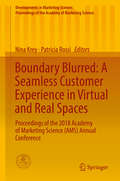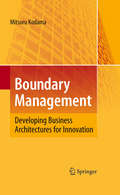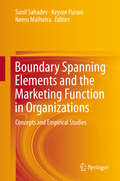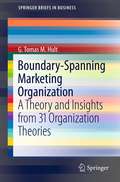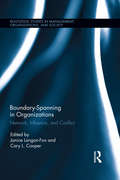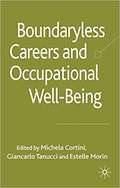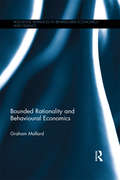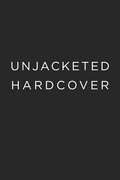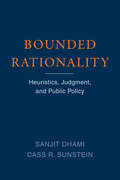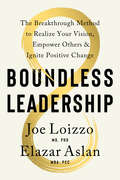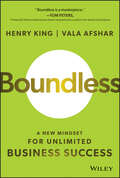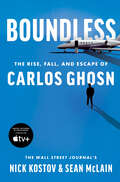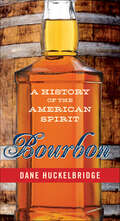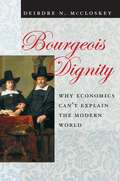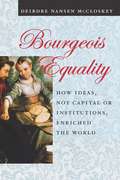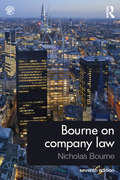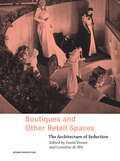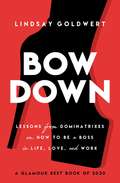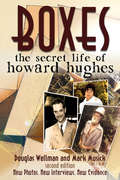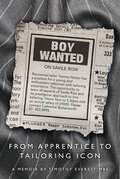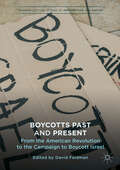- Table View
- List View
Boundaries of State, Boundaries of Rights
by Tsvi Kahana Anat ScolnicovThis collection of essays draws together innovative scholars to examine the relationship between two legal and political phenomena: the shrinking of the state as a monopoly of power in favour of the expansion of power over individuals in private hands, and the change in the nature of rights. The authors expertly discuss the implications of the changing boundaries of state power, the legal responses to this development, its application to human rights, and re-conceptualizations of public life as obligations are handed over to private hands. This innovative book deals with an important set of problems and offers a fresh perspective of different legal themes in an integrated fashion.
Boundary Blurred: Proceedings of the 2018 Academy of Marketing Science (AMS) Annual Conference (Developments in Marketing Science: Proceedings of the Academy of Marketing Science)
by Nina Krey Patricia Rossi“We see our customers as invited guests to a party, and we are the hosts. It’s our job every day to make every important aspect of the customer experience a little bit better.” Jeff Bezos, Founder and CEO of Amazon.com This proceedings volume explores the ways in which marketers can learn about customers through big data and other sources to create an enhanced customer experience. Consumers today do not simply demand engaging online or offline experiences anymore; they increasingly focus on one seamless experience throughout their journey across virtual and real spaces. While shopping in a physical store, consumers are checking their smart phones for customer reviews and competitive information, and catching a Pokémon or two at the same time. Online experience is no longer only about price shopping and convenience, and offline is no longer only about SKUs. Individual channels matter less and less; it is the omni-channel experience that is becoming main-stream. Marketers need to keep pace and continually adapt and contribute to the changing consumer landscape. Through countless touchpoints across different channels and media, marketers today can learn more about their customers and are better equipped than ever to provide them with a desired augmented experience: easy, fun, engaging, and efficient. Featuring the full proceedings from the 2018 Academy of Marketing Science (AMS) Annual Conference held in New Orleans, Louisiana, this volume provides ground-breaking research from scholars and practitioner from around the world that will help marketers continue to engage their customers in this new landscape. Founded in 1971, the Academy of Marketing Science is an international organization dedicated to promoting timely explorations of phenomena related to the science of marketing in theory, research, and practice. Among its services to members and the community at large, the Academy offers conferences, congresses, and symposia that attract delegates from around the world. Presentations from these events are published in this Proceedings series, which offers a comprehensive archive of volumes reflecting the evolution of the field. Volumes deliver cutting-edge research and insights, complementing the Academy’s flagship journals, the Journal of the Academy of Marketing Science (JAMS) and AMS Review. Volumes are edited by leading scholars and practitioners across a wide range of subject areas in marketing science.
Boundary Management: Developing Business Architectures for Innovation
by Mitsuru KodamaThis book presents the concept of business architecture and optimizing processes as a corporate system based on multiple corporate case studies, including Sony, NTT-DATA, NTT-DoCoMo, Toyota, Honda, Omron, Takara, Recruit, First Retailing, Panasonic and Canon.
Boundary Spanning Elements and the Marketing Function in Organizations: Concepts and Empirical Studies
by Sunil Sahadev Keyoor Purani Neeru MalhotraThis book presents current research on boundary spanning elements. The editors bring together extant knowledge in the field and present a uniform narrative. Previous studies have often been disseminated across several academic disciplines like services marketing, personal selling and sales management etc. and this monograph aggregates studies dealing with boundary spanning elements or has boundary spanning elements related to the marketing function as the main empirical platform under a uniform theoretical perspective. Each chapter in the book deals with an important research theme and synthesizes studies in relation to boundary spanning elements.
Boundary-Spanning Leadership: Tactics to Bridge Social Identity Groups in Organizations
by Christ Ernst Jeff YipAs structural and technological boundaries are dismantled, a flat world of boundaryless organizations gives rise to a different type of boundary found in intergroup relations. In organizations worldwide, leaders are challenged to bridge social identity boundaries between groups of people with different histories, perspectives, values, and cultures. How can leaders bring together groups who have historically remained apart? This chapter focuses on the role of boundary-spanning leadership: leadership that bridges boundaries across groups in service of a broader vision, mission, or goal. The authors provide a detailed description of four boundary-spanning tactics that leaders can use to span differences across groups of people in organizational settings. This chapter was previously published as chapter 7 of "Crossing the Divide: Intergroup Leadership in a World of Difference."
Boundary-Spanning Marketing Organization: A Theory and Insights from 31 Organization Theories (SpringerBriefs in Business #20)
by G. Tomas HultNow more than ever, marketing is assuming a key boundary-spanning role--a role that also redefined the composition of the marketing organization. In this Brief, the marketing organization's integrative and mutually reinforcing components of marketing activities, customer value-creating processes, networks, and stakeholders are delineated within their boundary-spanning roles. Expanding upon his article published in the Journal of the Academy of Marketing Science in 2011, Tomas Hult draws thematic marketing insights from the integration of thirty-one organization theories to advance knowledge on the boundary-spanning marketing organization within four areas: strategic marketing resources, marketing leadership and decision making, network alliances and collaborations, and the domestic and global marketplace.
Boundary-Spanning in Organizations: Network, Influence and Conflict (Routledge Studies in Management, Organizations and Society #26)
by Cary L. Cooper Janice Langan-FoxIn more recent times, the essence of the gatekeeper's role has moved to the 'boundary spanner' - a systems thinker who understands the specific needs and interests of the organization and whose greatest asset is their ability to move across and through the formal and informal features of the modern organization. There are many types of boundaries associated with an organization, for example, horizontal, (function and expertise), vertical (status, hierarchy), geographic, demographic, and stakeholder. Boundaries are "the defining characteristic of organizations and, boundary roles are the link between the environment and the organization" (Aldrich & Herker, 1977) with functions crucial to the effectiveness and success of the organization. Despite being a critical success factor for an organization, beginning in the 1970s, the term - 'boundary spanning' has had an intermittent research history: there has been no systematic body of research that has evolved over time. This book aims to invigorate, excite, and expand the literature on boundary spanning in a diverse range of disciplines such as sociology, organizational psychology, management, medicine, defence, health, social work, and community services. The book serves as the first collection of reviews on boundary spanning in organizations.
Boundaryless Careers and Occupational Well-Being
by Michela Cortini<p>The relationship between the so called boundaryless careers and the occupational wellbeing is a fascinating issue. <p>The themes of boundaryless and protean careers are noteworthy if we consider the challenges posed by a transition to more temporary employment arrangements from an industrial to a knowledge-based economy we are facing today. <p>The book is enriched by empirical data analysis and case studies, which on one hand allow an in-depth view of the relation between new careers and wellbeing for specialists and, on the other one, become a fertile benchmark for professionals to look at. <p>The novelty is represented by the effort of giving such construct an interdisciplinary approach, moving from law to organizational psychology, to economy, and to occupational health.</p>
Bounded Rationality and Behavioural Economics (Routledge Advances in Behavioural Economics and Finance)
by Graham MallardEconomics Nobel Laureate Herbert Simon developed the concept of bounded rationality in the 1950s. This asserts that the cognitive abilities of human decision-makers are not always sufficient to find optimal solutions to complex real-life problems, leading decision-makers to find satisfactory, sub-optimal outcomes. This was a foundational component of the development of Behavioural Economics but in recent years the two fields have diverged, each with its own literature, its own approach and its own proponents. Behavioural Economics explores the areas of commonality between Economics and Psychology, in terms of its focus and its approach, whereas the bounded rationality literature largely analyses the implications of sub-optimal decision‐making through the mathematically sophisticated methodology of mainstream Economics. This book examines the nature and consequences of this divergence and questions whether this is a case of beneficial specialisation or whether it is unhelpful, potentially stunting the development of some aspects of Economics. It has been suggested that the major deficiency of Behavioural Economics is that it has failed to produce a single, widely applicable alternative to constrained optimisation. This book evaluates the extent to which this is the true and, if it is, the extent to which it is a product of the divergence between the two literatures. It also seeks to identify commonalities between the two subjects and suggests avenues of research in Economics that would benefit from a re-fusion of these two fields.
Bounded Rationality and Economic Diplomacy
by Skovgaard Poulsen, Lauge N.Modern investment treaties give private arbitrators power to determine whether governments should pay compensation to foreign investors for a wide range of sovereign acts. In recent years, particularly developing countries have incurred significant liabilities from investment treaty arbitration, which begs the question why they signed the treaties in the first place. Through a comprehensive and timely analysis, this book shows that governments in developing countries typically overestimated the economic benefits of investment treaties and practically ignored their risks. Rooted in insights on bounded rationality from behavioural psychology and economics, the analysis highlights how policy-makers often relied on inferential shortcuts when assessing the implications of the treaties, which resulted in systematic deviations from fully rational behaviour. This not only sheds new light on one of the most controversial legal regimes underwriting economic globalization but also provides a novel theoretical account of the often irrational, yet predictable, nature of economic diplomacy.
Bounded Rationality and Politics
by Jonathan BendorBendor considers two schools of behavioral economics: the first guided by Tversky and Kahneman's work on heuristics and biases, which focuses on the mistakes people make in judgment and choice; the second described by Gerd Gigerenzer's program on fast and frugal heuristics, which emphasizes the effectiveness of simple rules of thumb.
Bounded Rationality: Heuristics, Judgment, and Public Policy
by Cass R. Sunstein Sanjit DhamiTwo leaders in the field explore the foundations of bounded rationality and its effects on choices by individuals, firms, and the government.Bounded rationality recognizes that human behavior departs from the perfect rationality assumed by neoclassical economics. In this book, Sanjit Dhami and Cass R. Sunstein explore the foundations of bounded rationality and consider the implications of this approach for public policy and law, in particular for questions about choice, welfare, and freedom. The authors, both recognized as experts in the field, cover a wide range of empirical findings and assess theoretical work that attempts to explain those findings. Their presentation is comprehensive, coherent, and lucid, with even the most technical material explained accessibly. They not only offer observations and commentary on the existing literature but also explore new insights, ideas, and connections. After examining the traditional neoclassical framework, which they refer to as the Bayesian rationality approach (BRA), and its empirical issues, Dhami and Sunstein offer a detailed account of bounded rationality and how it can be incorporated into the social and behavioral sciences. They also discuss a set of models of heuristics-based choice and the philosophical foundations of behavioral economics. Finally, they examine libertarian paternalism and its strategies of &“nudges.&”
Boundless Leadership: The Breakthrough Method to Realize Your Vision, Empower Others, and Ignite Positive Change
by Joe Loizzo Elazer AslanRealize your fullest leadership potential, claim your boldest vision, and prioritize the well-being of your team and world with this new science-based approach to leadership. Boundless Leadership provides a complete and systematic roadmap to finding meaning in your work, realizing your full leadership potential, and inspiring your team with resilience, innovation, compassion and confidence. Contemplative psychotherapist Joe Loizzo, MD, PhD, and executive advisor Elazar Aslan, MBA, PCC, offer a new science-based vision of leadership that prescribes disciplines of mind, heart, and body to help leaders cultivate clarity, compassion and fearlessness for themselves and throughout their organization. Boundless Leadership offers accessible, real world applications to bring ease to leading oneself and others, and provides examples from the authors' experience with clients, including CEOs of multi-billion-dollar businesses, entrepreneurs and managers trying to balance the complex challenges of work and life in our interdependent age. Each section includes a range of practices based on neuropsychology and contemplative science, including guided meditations to improve focus and awareness, cultivate empathy and compassion, and build fearlessness and flow. Each section also offers a practical application to ease daily challenges, including clarifying intentions for better decision-making, improving accountability and responsibility for better team collaboration, and embodying purpose to optimize impact on one&’s organization and society at large. Boundless Leadership is especially needed during this explosion of remote working and provides advice and guidance to remain productive and joyful when your work environment is in flux. Whether you're a CEO, manager, team leader, consultant, coach, social entrepreneur or community activist, this book offers the tools you need to clarify your vision, lead others, and ignite positive change in the world--giving you a much needed advantage in today&’s fast-paced digital age.
Boundless: A New Mindset for Unlimited Business Success
by Henry King Vala AfsharTransform your organization by making silos a thing of the past In Boundless, two leaders in transformation and customer success deliver an inspiring and exciting new approach to succeeding in an increasingly decentralized and digital-first world. In the book, you’ll learn how to demolish organizational silos once and for all, allowing resources to flow across networks, ecosystems, and communities. The authors explain the seven principles underlying their unique and effective “Boundless” paradigm: connection, integration, decentralization, mobility, continuity, autonomy, and shared success. Walking you through the blueprint for transformative, resilient business success, Boundless also offers: Strategies for mapping the Boundless principles to key technological advances, including digital platforms, blockchain, AI, robotics, cloud computing, and more Ways to achieve the operational, organizational, and technological shifts necessary to succeed in an entirely transformed world Tools for combatting the natural tendency of employees to accumulate and protect resources within company silosAn invaluable resource for managers, executives, directors, and other business leaders, Boundless will also earn a place in the libraries of founders, entrepreneurs, and consultants who seek to create an enduring competitive advantage for themselves or their clients.
Boundless: The Rise, Fall, and Escape of Carlos Ghosn
by Nick Kostov Sean McLainThe unprecedented rise and catastrophic fall of one of the world’s most feared and admired business executives—Carlos Ghosn—a remarkable story of innovation, hubris, alleged crimes, and daring international escape, as chronicled by two Wall Street Journal reporters.Carlos Ghosn always wanted more. Born in the Amazon, raised by a well-off—if scandalized—family in Beirut, and educated in Paris, Ghosn rose to prominence at Michelin in the United States, Renault in France, and Nissan in Japan. Along the way he earned monikers of Le Cost Killer, for his incisive business savvy, and Mr. 7-Eleven, for the hours he devoted to his work.Initially Ghosn thrived, becoming a poster boy for globalization and multinational corporations. Employees believed him to be among the greatest business minds of his generation, and the press hailed him a financial genius. The trouble started when Ghosn began to believe them. His power rose in tandem with an increasing certainty that he was underpaid and undervalued at his multiple posts. Executives grew unhappy with Ghosn’s talk of a merger with Renault, calling his loyalty to Nissan into question. Resentments brewed, enough so that a group of Nissan executives set out to uncover the truth about the man who many throughout Nissan and Japan perceived as a savior. Eventually, Ghosn was accused of financial misconduct and arrested for a bevy of alleged crimes—all of which he vehemently denied. Yet even as he insisted his financial transactions were above board, Ghosn was planning an astounding escape, one that would either smuggle him out of Tokyo and back to his ancestral homeland of Lebanon; or land him in a Japanese prison for life. Drawning from intensive investigative reporting, and including never-before-seen insider details from key players in Ghosn’s life and the investigations into him, Nick Kostov and Sean McLain piece together this fallen icon’s life and actions across the globe. Their sensational globetrotting adventure reveals the complexity of a man who watched for decades as contemporaries with far less talent amassed far greater wealth, and who took drastic measures to ensure he would finally get his due.
Bourbon: A History of the American Spirit
by Dane Huckelbridge“THE DEFINITIVE HISTORY OF BOURBON.”—Sacramento BeeA Southern Independent Booksellers Alliance BestsellerA ROLLICKING BIOGRAPHY OF BOURBON WHISKEY THAT DOUBLES AS “A COMPLEX AND ENTERTAINING” (WALL STREET JOURNAL) HISTORY OF AMERICA ITSELFFew products are so completely or intimately steeped in the American story as bourbon whiskey. As Dane Huckelbridge's masterfully crafted history reveals, the iconic amber spirit is the American experience, distilled, aged, and sealed in a bottle.
Bourgeois Dignity: Why Economics Can't Explain the Modern World
by Deirdre NansenThe big economic story of our times is not the Great Recession. It is how China and India began to embrace neoliberal ideas of economics and attributed a sense of dignity and liberty to the bourgeoisie they had denied for so long. The result was an explosion in economic growth and proof that economic change depends less on foreign trade, investment, or material causes, and a whole lot more on ideas and what people believe. Or so says Deirdre N. McCloskey in Bourgeois Dignity, a fiercely contrarian history that wages a similar argument about economics in the West. Here she turns her attention to seventeenth- and eighteenth-century Europe to reconsider the birth of the industrial revolution and the rise of capitalism. According to McCloskey, our modern world was not the product of new markets and innovations, but rather the result of shifting opinions about them. During this time, talk of private property, commerce, and even the bourgeoisie itself radically altered, becoming far more approving and flying in the face of prejudices several millennia old. The wealth of nations, then, didn’t grow so dramatically because of economic factors: it grew because rhetoric about markets and free enterprise finally became enthusiastic and encouraging of their inherent dignity. An utterly fascinating sequel to her critically acclaimed book The Bourgeois Virtues, Bourgeois Dignity is a feast of intellectual riches from one of our most spirited and ambitious historians—a work that will forever change our understanding of how the power of persuasion shapes our economic lives.
Bourgeois Equality: How Ideas, Not Capital or Institutions, Enriched the World
by Deirdre N. MccloskeyThere's little doubt that most humans today are better off than their forebears. Stunningly so, the economist and historian Deirdre McCloskey argues in the concluding volume of her trilogy celebrating the oft-derided virtues of the bourgeoisie. The poorest of humanity, McCloskey shows, will soon be joining the comparative riches of Japan and Sweden and Botswana. Why? Most economists--from Adam Smith and Karl Marx to Thomas Piketty--say the Great Enrichment since 1800 came from accumulated capital. McCloskey disagrees, fiercely. "Our riches," she argues, "were made not by piling brick on brick, bank balance on bank balance, but by piling idea on idea." Capital was necessary, but so was the presence of oxygen. It was ideas, not matter, that drove "trade-tested betterment." Nor were institutions the drivers. The World Bank orthodoxy of "add institutions and stir" doesn't work, and didn't. McCloskey builds a powerful case for the initiating role of ideas--ideas for electric motors and free elections, of course, but more deeply the bizarre and liberal ideas of equal liberty and dignity for ordinary folk. Liberalism arose from theological and political revolutions in northwest Europe, yielding a unique respect for betterment and its practitioners, and upending ancient hierarchies. Commoners were encouraged to have a go, and the bourgeoisie took up the Bourgeois Deal, and we were all enriched. Few economists or historians write like McCloskey--her ability to invest the facts of economic history with the urgency of a novel, or of a leading case at law, is unmatched. She summarizes modern economics and modern economic history with verve and lucidity, yet sees through to the really big scientific conclusion. Not matter, but ideas. Big books don't come any more ambitious, or captivating, than Bourgeois Equality.
Bourland Companies
by William J. Poorvu John H. Vogel Jr.Michael Bourland, the president of the Bourland Companies, needs to refinance two properties, an office building in southern New Hampshire and a retail property in Massachusetts. He is considering three alternatives: a renewal of a bank mini-perm, a 15-year mortgage from an insurance company, and a new securitized loan offered by the Bank of Boston. The case focuses on issues related to mortgage securitization and how it stacks up against other products in the market. Also raises issues about family real estate businesses.
Bourne on Company Law
by Nicholas BourneAn ideal introductory textbook, Bourne on Company Law offers a succinct overview of the fundamental areas covered in LLB and GDL courses. The text is clear and easy to follow, being presented in short, sub-headed sections for ease of navigation, and is thoroughly cross-referenced to highlight connections across topics. Written for both law and non-law students, this text offers straightforward explanations of all key cases, as well as chapter summaries and end of chapter questions to aid understanding. The book is also supported by a companion website offering self-test questions, a useful glossary and annotated web links.
Boutiques and Other Retail Spaces: The Architecture of Seduction (Interior Architecture)
by David Vernet Leontine De WitPresenting a critical and theoretical dimension to retail design, Boutiques and Other Retail Spaces links the ideas behind it to real practice in this innovative and important contribution to architectural/interior theory literature. Retail structure has been subject to a dramatic and ongoing transformation over the past thirty years, materializing in the emergence of large-scale out-of-town shopping centres and new specialized shops in city centres. These specialized boutiques are highly designed, involving well-known architectural firms such as OMA/Rem Koolhaas, David Chipperfield, Herzog + de Meuron amongst others. With case studies and over 100 black and white images, Vernet and de Wit set forth original and well-grounded theory to accompany this popular and lucrative area of work.
Bow Down: Lessons from Dominatrixes on How to Get Everything You Want
by Lindsay GoldwertPopular podcast host and personal finance expert Lindsay Goldwert explores what professional dominatrixes can teach us about confidence, power, and happiness. Imagine, for a moment, a world where the usual power dynamic is turned on its head. Where women not only stop apologizing, but seize—and enjoy—control. This is the quickly-mainstreaming world of BDSM (bondage, discipline, sadism, masochism)—and it has a lot to teach women about empowerment, negotiation, open-mindedness, and more. Popular podcaster and personal finance expert Lindsay Goldwert has traveled across the United States to meet the stars of the subculture, who spoke frankly with her about their lives and work. In Bow Down, these Alpha women show how you can reset the power dynamic in any situation to get what you want—whether it&’s from a husband, boss, or partner. They share strategies for revolutionizing not only your sex life, but your career, your relationships, and most importantly, your inner foundations. With bondage gear popping up on the big screen, the runway, the red carpet, and in celebrity lingerie lines, BDSM is officially moving out of the dungeon and into the sun. Let Bow Down help you learn how to use it—in the bedroom, the boardroom, and everywhere else.
Boxes: Second Edition
by Douglas Wellman Mark MusickThis second edition of Boxes: The Secret Life of Howard Hughes continues the history-changing story of Eva McLelland and her reclusive life married to a mystery man she discovered was Howard Hughes. New witnesses have come forward with personal stories, additional evidence, and photographs. Hughes's links to the murder of mobster Bugsy Siegel and the killers of President John F. Kennedy are revealed as well as the real identity of the long-haired crazy man that Hughes placed in the Desert Inn Hotel to distract the world while he escaped. Eva McLelland kept her secret for thirty-one stressful years as she lived a nomadic existence with a man who refused to unpack his belongings for fear he would be discovered and have to flee. Only her husband's death finally released her to tell the story that had been burning inside her for decades.
Boy Wanted on Savile Row: From Apprentice to Tailoring Icon
by Timothy EverestThe son of restaurateurs, young Timothy Everest wanted nothing more than to be a racing driver. This was not to be, but little did he know that a job he took at age 17 – as a sales assistant at Hepworths in Milford Haven – would set the trajectory for success to come.Boy Wanted on Savile Row is the remarkable story of Everest’s meteoric rise in the British fashion industry. Starting in the 1980s and studying under Tommy Nutter, the rebel of Savile Row, while rubbing shoulders with the likes of Steve Strange and Boy George, he branched out on his own the following decade. Here he initially styled bands and pop stars, before spearheading the ‘Cool Britannia’ generation and becoming the face of the New Bespoke Movement. After earning over 3,500 clients, including Tom Cruise, David Beckham and Jay-Z, to name but a few, Everest turned his hand to tailoring for film, creating some truly iconic pieces for such franchises as James Bond and Mission Impossible.In this revealing memoir, featuring a wealth of famous names and celebrity anecdotes, Timothy Everest details the evolution of British tailoring that has shaped the way we view and buy our clothes.
Boycotts Past and Present: From the American Revolution to the Campaign to Boycott Israel (Palgrave Critical Studies of Antisemitism and Racism)
by David FeldmanIn this book historians and social scientists examine boycotts from the eighteenth century to the present day. Employed in struggles against British rule in the American colonies, against racial discrimination in the United States during the Civil Rights movement, and Apartheid in South Africa, today it is Israel that is the focus of a campaign for Boycott, Divestment and Sanctions (BDS). Boycotts have featured in campaigns undertaken by labour, consumer and nationalist movements. Jews were the focus of some boycotts instigated by nationalist movements in Central and Eastern Europe and Jewish businesses were targeted by the National Socialist regime in Germany. In this collection, contributors explore the history of past boycott movements and examine the different narratives put forward by proponents and opponents of the current BDS movement directed against Israel: one which places the movement within a history of struggles for ‘human rights’; the other which regards BDS as the latest manifestation of an antisemitic tradition.

